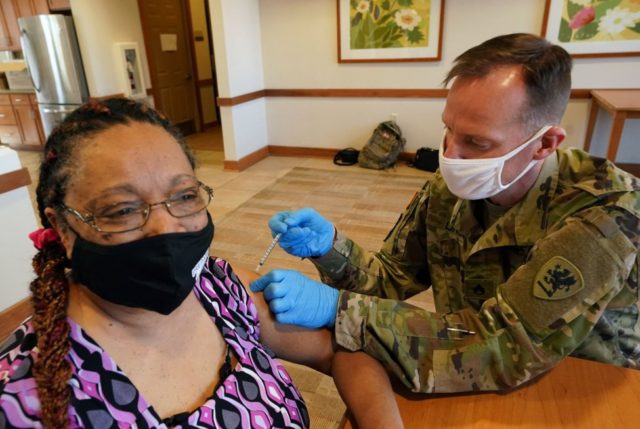Oct. 13 (UPI) — Scientists at the Food and Drug Administration said Wednesday that studies indicate a booster for the Johnson & Johnson COVID-19 vaccine may offer greater protection to recipients, but ultimately concluded that they’re unsure when that extra shot should be given.
The scientists outlined their review of the vaccine in a 54-page document to be presented at a meeting of the FDA’s Vaccines and Related Biological Products Advisory Committee on Thursday and Friday.
The committee will weigh a request from Johnson & Johnson to endorse a booster for its one-shot vaccine to extend immunity against COVID-19.
“Although not independently confirmed by FDA from datasets, summaries of the data suggest there may be a benefit in a second dose administered approximately 2 months after the primary dose,” they wrote.
The scientists noted that Johnson & Johnson subsidiary Janssen, which produces the vaccine, asked for authorization for a booster six months after the original shot, but also said one could be given as early as two months after vaccination.
Johnson & Johnson submitted evidence to the FDA that its single-shot dose provided decreased protection against the virus.
In their document Wednesday, the FDA experts said the data presented make it difficult to say for sure how effective a booster would be after six months, since Johnson & Johnson studied only a small number of people at that interval.
They also said the data doesn’t give much information on how effective the vaccine is against the more contagious Delta variant.
“Finally, the small number of accrued cases confirmed to be caused by the Delta variant precludes any conclusion regarding efficacy against that variant,” they wrote.
“[It’s not known] if there will be an increased risk of these or other adverse reactions after a booster dose. … These risks and associated uncertainties have to be considered when assessing benefit and risk.”
Further, the scientists said that while the single-dose Johnson & Johnson vaccine “still affords protection against severe COVID-19 disease and death,” it’s still less effective than the Moderna and Pfizer vaccines.
The scientists note that the Johnson & Johnson vaccine provides effectiveness that ranges between 72% and 81% against COVID-19 hospitalization.
Wednesday, the agency scientists questioned whether a booster dose is needed for those who received Moderna’s vaccine. They said the two-shot regimen appears to provide sufficient immunity against the virus.

COMMENTS
Please let us know if you're having issues with commenting.